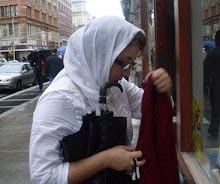
I took this along the beach in Bordj el Kiffan; here you have spraypainted signage in Arabic, one of the three main languages of Algerie. What does it say? It says: "Urinating is forbidden." They didn't see fit to repeat the message in French or Kabyle. I'm assuming they ran out of space.
The most common tongue across the broad northerly swath of Africa called the Maghreb is a dialect of Arabic called Darija. There are many who would argue it is not a dialect of Arabic at all but rather its own language, as it is not very mutually intelligible with other dialects. There is a grocery list of words that are found only in Darija; each regional variant of it also has a customized grocery list. As in the evolution of English, the Darija dialects of the Maghreb are the product of a region swept by successive waves of invaders, each of whom left their indelible lingual mark. The language spoken in the everyday by most Arabized Algerians is a melange of Arabic, Turkish, French, imposed on the indigenous Tamazight (Berber). If one delves deeper, one can probably find words that originated in Latin, from back when the land was Numidia, a client state of the Roman Empire. It is perhaps because of this that most Algerians seem perfectly willing to (and often prefer to) transliterate their everyday languages into characters familiar to Western eyes: the Roman alphabet has been part of the landscape for a very long time.
After the Revolution, despite an attempt to make Modern Standard Arabic the official working language (never quite took since no one speaks MSA), the Romanized spellings of placenames and such were standardized according to French standards: hence, for example, the transcription "Oued" rather than the more standard transcribed Arabic "Wadi."
The word for “crazy” in most spoken and written Arabic dialects is “majnoon”; it can mean mentally ill (pejoratively), deranged, disturbed, eccentric, reckless, feckless, foolish, or lovestruck – just as “crazy” can mean all those things in English, for good or ill. The states so described by the English word “crazy” are so universal to the human condition that it would not surprise me to find that many of the languages on this earth had a similar nuanced corresponding word, as Arabic does. However, “majnoon” is not the word most commonly used in Algeria. The word “mahboul” is the word just about everyone uses – Arab and Imazighen alike. Same meanings, different word.
The word “mahboul” is not found much in the lexicon of other forms of Arabic. However, the word “ahlboula” is found in Kabyle, the most widely-spoken of the Tamazight dialects of the country. I'm no linguist, but that's a cognate if I ever saw one. The Imazighen are definitely not an Arab people, and their languages are not like Arabic, except perhaps on the edges, where the two languages have met.
Where people meet, they exchange, whether either or both parties are willing partners in the exchange. Often the dominant partner in the exchange downright refuses to believe it picked up anything from the subject partner apart from what it wanted to snatch away. This is rarely true, no matter what colonizing cultures prefer to tell themselves. Everyday cultural traditions of subjugated people are the tiny burrs and barbed seeds clinging to the expensive sturdy pants of the invader, ready to quietly drop into his stringently cultivated garden plot and find a way to survive and sprout. Sometimes they straggle, eking out a frail existence in silence, hoping the weeding hand passes them by; sometimes they flourish until the garden scarce resembles what its planner had in mind, but is prettier and more vigorous. Whether its owner likes it or not.
This is as true of language as any other custom. If a word proves useful and particularly adroit, it will slip into common usage, sometimes to the chagrin of those who posit themselves as standard-bearers of the dominant culture. Over time even those people may forget the suspect origins of the word, and it will just be...part of the scenery.
Where all this talk of gardening is leading as far as a point: everyone in Algeria knows that “mahboul” is an Algerian word: its precise origin can be claimed as either Arabic or Kabyle, depending on whom you're talking with. Now it has entered the French lexicon as a synonym for “fou”; the means of this – and the relative status of this synonym in the linguistic section of le Jardin du Francais – should be apparent. In this imagined French garden, anything Algerian is still a dandelion. Tenacious, scrappy, and self-rejuvenating, bouncing back from disaster always. It might have a rough cheerful prettiness (not up to the dominant standards of aesthetics, of course), and it certainly has its charms and uses, it may even make a nice salad, but in the end it's a weed.
The modern Western view of the flower garden – and lawns, as well – is rooted (sorry) in the traditions beginning in the Renaissance and developing through the Age of Reason and through the Victorian era, where a pleasure garden was created and cultivated as a kind of microcosm of an “ideal” and carefully controlled natural world, from the Neoclassical symmetry of the 18th century to the romanticized wishful “wildness” of the 19th century. Seeing the pleasure garden as a symbol of the European and American view of the world makes this...thing I just wrote...a lot less strained as metaphor goes. Inchallah. It goes without saying that the pleasure garden of Islamic tradition is a different kettle of fish in some respects.
I didn't really know the word “mahboul” before I got to Algerie. I learned the meaning pretty quickly; it was the right word for describing my own self.

